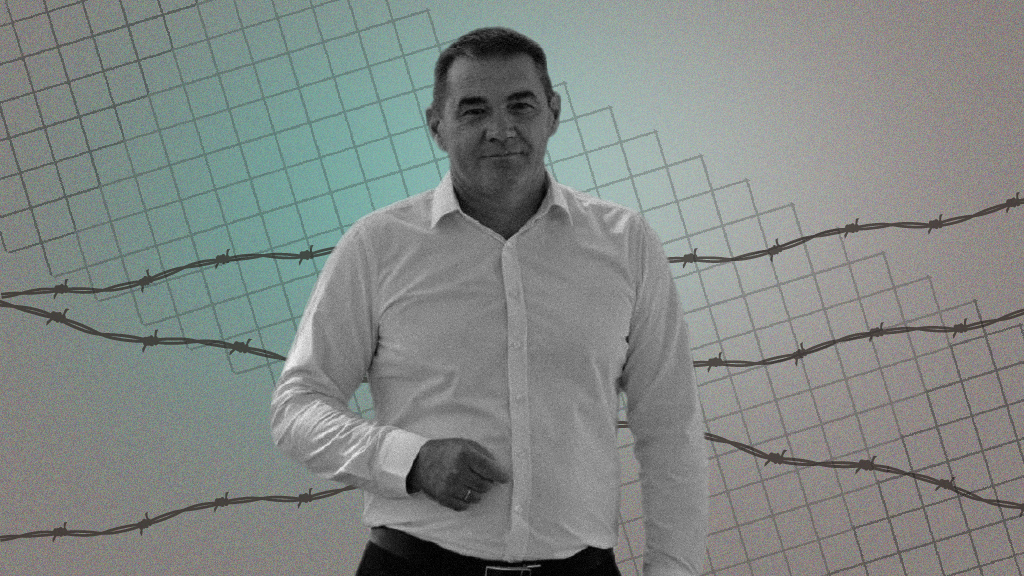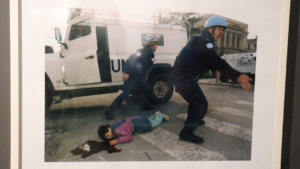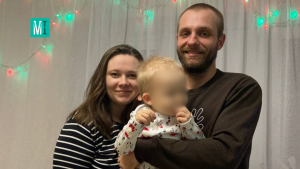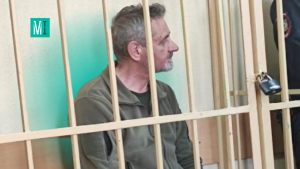“He was Hard to Deal with”: Oleksandr Babych, the Mayor of Hola Prystan, has been Held in the Crimea Pre-Trial Detention Center for Eight Months

Oleksandr Babych, the Mayor of Hola Prystan, Kherson Region, disappeared at the end of March. He is currently held in a pre-trial detention center in the occupied Crimea. He has no means to communicate with the outside world. His lawyer is not allowed to visit him.
On the morning of February 24, residents of Hola Prystan, located on the left bank of the Dnieper 11 km from Kherson, discovered that there were no police officers in the city, and the door of the Military Commissariat was locked. The Hola Prystan Amalgamated Territorial Community came under the control of the Russian army in the first days of the full-scale invasion. However Russian troops did not immediately enter the city. They set up roadblocks behind it and were based in forest strips and nearby villages. Thanks to this, the Ukrainian authorities continued to work. This lasted for a month.
Deputy Mayor of Hola Prystan Svitlana Linnyk (the President appointed her as the Head of the Hola Prystan City Military Administration in November) tells MIHR that the news about the beginning of a full-scale invasion caught her and Mayor Oleksandr Babych on a train. They were returning from Kyiv, where they had been on a business trip. “We went to the capital because of yet another complaint filed by Member of Parliament Oleksii Kovalov. He is a resident of our city and was elected to the Parliament from the 183rd district, which includes the Hola Prystan ATC. Kovalov claimed that Babych did not manage the city efficiently,” says Svitlana Linnyk.
At the time of the Russian invasion, the Mayor of Holaya Prystan held this post for the second time. According to Linnyk, Kovalov put up and supported his own candidate for this position during the 2020 elections. “He wanted Anatolii Nehra, the previous mayor, to lead the city government, so he blocked the work of election commissions and his representatives threatened voters in order for them not to vote for Babych. Moreover, Kovalov managed to register a candidate with the same last name and first name as Babych has to take part in the elections in order to influence the vote. Despite this, Oleksandr Babych, who had been put up by the Batkivshchyna Party, received 53% of votes. Everyone saw results of his work: before his first victory in the elections, the community was second to the last in the oblast in terms of budget and socio-economic development indicators, at the end of his term it ranked number one,” continues Linnyk.
Svitlana believes that the history of confrontation between the mayor and the MP is important for understanding the context of Babych’s abduction. And she draws particular attention to the words that the MP said on February 24.
“We were traveling by train. We were in a hurry to get to our hometown in order to hold a session and make changes to the budget. Before the session, the Mayor, our colleagues and me had a discussion in the office, suddenly Oleksii Kovalov called me on WhatsApp, he was in a state of euphoria. I switched to the speaker mode and he said, “Tell your boss that sleepless days and nights will begin for him.” It was an explicit threat to Babych. I, Babych and our city council colleagues heard his words,” says the Deputy Mayor.
But we will talk about this later.
Ural Trucks, Armored Personnel Carriers, Tigrs and More Than Two Thousand Russian Troops
Due to the fact that the Russian troops did not enter settlements during February and almost the entire March, Oleksandr Babych fulfilled his duties.

Oleksandr Babych, the Mayor of Hola Prystan
“We issued certificates and paid social benefits. In addition, we organized delivery of humanitarian aid and created points where potatoes were dispensed; school cooks prepared hot lunches that were delivered to vulnerable groups of people, baked and distributed bread; and we arranged for delivery of flour. In the first days of the war, people bought up everything in supermarkets, but the Mayor arranged that the products stored at the warehouse in Oleshky should be brought first to Hola Prystan. At our peril and risk, we organized the delivery of yeast from Kherson. We brought it quietly by boats and distributed it among city residents,” continues Linnyk.
She recalls that the Mayor traveled around the city at night and checked patrol groups; in the morning they visited all headman offices, that were already occupied by Russians, and talked to headmen.
“We had to drive through enemy checkpoints. Oleksandr showed his driver’s license to Russian servicepersons, but they had no idea that the Mayor and his deputy could inspect the territory of the community every morning. In the morning, one of the members of the city council went around the city and informed citizens of the roads that were safe for driving, and places where enemy roadblocks were located. We took office equipment and everything of value to us from the city council in advance: Ukrainian flags, personnel files and accounting records,” says the deputy Mayor.
The Mayor’s family, together with residents of the Hola Prystan community, took part in pro-Ukrainian rallies, unfurled an 80-meter flag with bands of blue and yellow and chanted slogans in support of unity, statehood and the Armed Forces of Ukraine.

Olga Babych and Oleksandr Babych together with their children at a pro-Ukrainian rally in Hola Prystan on March 8, 2022
“Oleksandr had over one hundred phone calls per day. Different people called him – some asked for flour and diapers, some reported the movement of enemy vehicles, farmers complained that occupiers took away their agricultural equipment,” Olha, Babych’s wife, recalls in a conversation with MIHR. “Sometimes it seemed to me that people hoped that Oleksandr could force enemy troops to leave the community. In the evening, after work, he organized patrols from among the patriots of our city, those who were interested in the destiny of our motherland, not their own stomachs. They tried to protect property, detained looters, established where enemy equipment was coming from and where shots were being fired, all this was recorded and photographed.”
Olha stayed with Oleksandr until the end of March. Then she left the occupied territories together with her children.
“It took us three days to travel 70 kilometers to Mykolaiv. We drove through mined fields. And when we arrived in Mykolaiv, we saw several patrol cars from Hola Prystan there. How did they end up there? I didn’t understand why they were there and had left us in the most difficult times,” she adds.
Then Olga says, “Later, Russians began to kidnap village heads. Rumors circulated in the city that Oleksandr would be the next.”
At the end of March, it became known about a number of arrests. On March 20, Russian servicepersons in an armored vehicle drove up to the checkpoint of Hola Prystan volunteers. They detained two men and accused them of monitoring movement of Russian vehicles. The men were beaten, but released in the evening.
On March 21, Russians captured Viktor Maruniak, the headman of the village of Stara Zburivka, which is part of the Hola Prystan ATC. Maruniak was held for three weeks and released on April 12. He says that he has nine broken ribs, that he was tortured with electric current.
“When I was taken away, Babych was not captured yet,” Maruniak tells MIHR. “And when I was released, the FSB officer wearing a mask said to me, “Do you know that we overthrew Babych?” That is, they detained him.”
Russians in Urals, APCs, and Tigrs entered Hola Prystan at seven o’clock in the morning on March 28. Soldiers armed with machine guns walked along the fences of private houses. In total, more than two thousand troops invaded the city.
“I remember that I called the Mayor, who had just returned home after a night shift,” says Svitlana Linnyk. “When he heard what was happening, he said that he was leaving for work. I arrived earlier then he and saw that the city council building had already been taken over. A man in a military uniform without identification marks called himself Oleksii and said he was in charge. Russians had lists and already knew the names of employees. Oleksii tried to persuade me to cooperate, asked if I did not want to live amicably, as in the USSR and criticized our president. Later, the Mayor was brought in a white Mercedes minibus with tinted windows. It turned out that the occupiers had kidnapped Babych from his own yard. He was under guard in his office for some time. Then a Russian named Oleksii ordered to take the Mayor out. Babych took a warm jacket and gave me the keys to his house and company car. He was again put into a white minibus, in which armed men in black could be seen. The bus moved towards Skadovsk. Since then, he has never contacted me.”
“Babych was a nuisance for them because he did not leave his community. For him, his oath is not just empty words.”
“Oleksii Kovalov wanted to fully control the region. He never hid his intentions, and Babych was a problem for him. The occupation, especially when an MP supported it and cooperated with Russians, is a good reason to influence Babych,” Svitlana Linnyk believes.

Member of Parliament Oleksii Kovalov
The fact of Kovalov’s conflict with Babych is also confirmed by Maruniak.
“In the last election, Kovalov wanted his own candidate to become the Mayor. But many people knew that Kovalev was a swindler who made his fortune through fraudulent schemes with expensive land plots located along rivers and the sea. Although he positioned himself as an agricultural producer, he actually made money by reselling captured land. After Babych won for the second time, Kovalov intensified pressure on him. Several times, the Prosecutor’s Office and the police audited the activities conducted by the Mayor and City Council because of Kovalov’s complaints. And inspectors every time confirmed that there were no irregularities in the work of the City Council and the Mayor.”
We would like to note that Oleksii Kovalov was not a well-known person in the region before his election as an MP. In 2011, he worked as a legal adviser at the Communal Establishment of the Kherson Oblast Council “Hola Prystan Geriatric Boarding House”. He has been the director of the Private Enterprise “LK-AGRO” and its co-founder since 2018. Since 2017, he has been the founder and director of the LLC “Khersonski Ahrarii” (Kherson Farmers). Linnyk says that while working at the boarding house, Kovalov used personal documents of elderly residents of the establishment to carry out illegal transactions involving their property and land, and thus earned his first fortune. “Then he was involved in production of land management projects, but he was deprived of his license, however he continued his work using someone else’s license. There were a large number of criminal cases against him. He forged judges’ decisions and seals, and illegally registered land plots. He used documents of ATO participants in order to obtain benefits for land title registration,” she adds and claims that Kovalov dreamed of implementing his plans based on resolutions adopted by the City Council, but it blocked them. “Mayor Oleksandr Babych was the biggest obstacle to Kovalov. It is because of this that after his election as a Member of Parliament (in 2019, he was elected as the MP from the Servant of the People Party and became a member of the Finance, Tax and Customs Policy Committee, – MIHR) he began to actively block the work of local governments and file all kinds of complaints. The MP status helped him – Kovalov kicked every door open,” Linnyk adds.
At the beginning of the occupation, MP Oleksii Kovalov arrived in the temporarily occupied territory of the Kherson region – he wrote on Facebook that he should work in his district. On June 8, Kovalov admitted that he cooperated with the occupation authorities and announced that “Russia is here forever, and the closest integration with Russia is already underway.”

On June 8, on his Facebook page, Oleksii Kovalov announced the close integration of Kherson Oblast with Russia
In April, the Prosecutor General’s Office of Ukraine initiated criminal proceedings against MP Oleksii Kovalov. “It was established that the MP cooperated with the occupying forces of the Russian Federation in the temporarily occupied territory of Kherson Oblast. The enterprises controlled by him supply food products to the Autonomous Republic of Crimea that are sold on the territory of the Russian Federation, and also import fuels and oils from the occupied Crimea to the Kherson region,” the State Bureau of Investigation reported on June 8. In addition, as claimed by the SBI, Kovalov provided accommodations for Russian soldiers on the premises of the sanatorium controlled by him in Hola Prystan. Finally, in July, the SBI notified him of suspicion of high treason and issued a wanted notice.
On August 28, Oleksii Kovalov was found dead in his house in Hola Prystan.
The decree of the President of the Russian Federation on awarding Oleksii Kovalov the Order of Courage (posthumously) was issued on October 7.

Screenshot of Putin’s decree on awarding Kovalov the Order of Courage
Kovalov’s mother and his brother Yurii received the award from the hands of First Deputy Head of President Putin’s Administration Oleksandr Kiriyenko.

Serhii Kiriyenko hands over the Order of Courage to Kovalov’s mother and brother
It should be noted that, according to the CHESNO movement, Oleksii Kovalov’s brother Yurii helped his brother. In particular, as the Director of the State Institution “Kherson Production and Experimental Plant for Breeding Juvenile Common Fresh Water Fish” in Hola Prystan, he could participate in bribing voters. Yurii Kovalov ran for office and was elected to the Kherson Oblast Council as a candidate put up by the Servant of the People party.

Yurii Kovalov, the brother of Oleksii Kovalov
“Babych was a nuisance for them because he did not leave his community. There are few people like my husband, but they do exist. Oleksandr understood what state the people, abandoned by all, would get into if they were left by the last captain. For him, his oath is not just empty words,” says Olha Babych.
After six months of silence, Babych was found in the Simferopol Pre-Trial Detention Center
For a long time, neither Olha nor Svitlana knew about Oleksandr Babych’s whereabouts. It was not even known whether he was alive.
At the end of June, some media and the Association of Ukrainian Cities reported that Oleksandr had allegedly been released from captivity. This piece of news spread instantly. Olha Babych began receiving congratulations. Later it turned out that there was a mistake. Olha was very upset and believes that this incident pushed her back in her fight for her husband’s release, because she had to once again seek the status of a captive to be given to him.
In August, it became known that the Mayor of Hola Prystan was first held in Kherson Oblast and then taken to Crimea. In the summer, he was kept in Simferopol Pre-Trial Detention Center No. 1. In November he was transferred to Pre-Trial Detention Center No. 2. For some time, Babych stayed in the same cell with Mario Garcia Calatayud, a Spanish volunteer from Kherson. Babych feels depressed.
Russian authorities do not officially confirm his detention. Grounds for detaining Babych are also not known – the Mayor of Hola Prystan has no access to a lawyer.
Viktor Maruniak, the headman of the village of Stara Zburivka, talks about the possible reasons for long-term detention: “Babych is a patriot.
I have known him for a long time. He has always been active in Hola Prystan. He has served as a member the Hola Prystan City Council for several terms. He took part in the Maidan Revolution in 2004 and in removing the monument to Lenin. After 2014, he provided support to the army. Every year funds were allocated from the city budget to support servicepersons. Half a million was earmarked for 2022.”
Olha Babych has appealed to all those responsible for exchanges in Ukraine, as well as lawyers and human rights defenders. “Some people tell me that it is the wrong time to think about civilians. Service persons should be freed first. And we have to wait till the end of the war. I have absolutely nothing left: my husband was kidnapped, Russian soldiers live in our house, and our possessions were looted,” she adds and hopes that her husband will be released soon.







